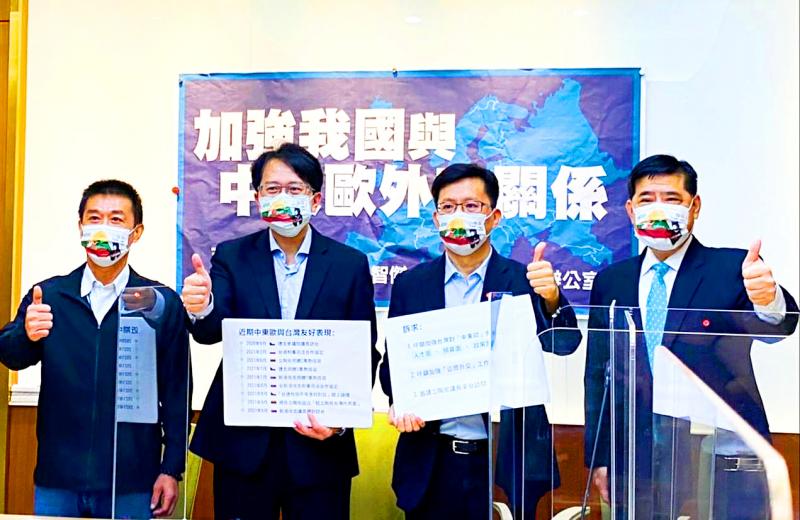The Legislative Yuan’s Friendship Association With the Baltic States yesterday urged the government to adopt policies to deepen relations with central and eastern Europe.
Association members Democratic Progressive Party (DPP) legislators Chiu Chih-wei (邱志偉), Chang Liao Wan-chien (張廖萬堅) and Hsu Chih-chieh (許智傑) urged the Ministry of Foreign Affairs to step up collaboration with the legislature to bolster Taiwan’s diplomatic outreach efforts to central and eastern European countries.
By establishing connections with small, democratic countries in the EU that share similar views and values with Taiwan, it would be possible to find a way out of the nation’s diplomatic quandary, the association said at a news conference.

Photo: Lu Yi-hui, Taipei Times
Chiu suggested the establishment of a “travel bubble” program with countries in central and eastern Europe, similar to the one with Palau, adding that travel bubbles, which allow people to move freely without undergoing quarantine, would facilitate bilateral relations.
The association has plans to invite Lithuanian Parliamentary Speaker Viktorija Cmilyte-Nielsen to Taiwan, he said.
The ministry should consider including eastern European languages in its exams, as fluency in Baltic languages would increase the efficiency of promoting bilateral relations, he added.
Chiu called for the ministry to adjust its funding for the region and to expand the list of countries eligible to apply for the Taiwan-Europe Connectivity Scholarship program.
The ministry should consider emulating Japan and issuing an annual diplomatic blue book to inform the public on its diplomatic strategies and its take on international affairs, which would allow the public to act in a way that would improve Taiwan’s reputation, he said.
The government should negotiate starting direct flight services with the Czech Republic, especially Prague, Hsu said, adding that other direct-flight destinations in eastern and central Europe should also be considered to tighten economic and tourism ties with the region.
The ministry should also initiate a review on how to best utilize its offices in the Visegrad Group to interact with more European countries, he said.
Chang Liao suggested stepping up interaction between the legislatures of Taiwan and the Baltic states.
The countries in central and eastern Europe have experienced similar oppression that Taiwan has undergone, and they also strive to achieve democracy and liberty, he said.
They have spoken highly of Taiwan’s information and electronics industries, and are interested in attracting Taiwanese businesses to invest in the region, which would improve Taiwanese-European interaction in technology, education and industry development, he added.
Thanking the Czech, Lithuanian and Slovakian governments for their donations of COVID-19 vaccines to Taiwan, Ministry of Foreign Affairs Director-General of European Affairs Remus Chen (陳立國), who represented the ministry at the news conference, said he would relay the association’s suggestions to the ministry and would discuss them in-depth.
Additional reporting by Lu Yi-hui

Taiwan has received more than US$70 million in royalties as of the end of last year from developing the F-16V jet as countries worldwide purchase or upgrade to this popular model, government and military officials said on Saturday. Taiwan funded the development of the F-16V jet and ended up the sole investor as other countries withdrew from the program. Now the F-16V is increasingly popular and countries must pay Taiwan a percentage in royalties when they purchase new F-16V aircraft or upgrade older F-16 models. The next five years are expected to be the peak for these royalties, with Taiwan potentially earning

STAY IN YOUR LANE: As the US and Israel attack Iran, the ministry has warned China not to overstep by including Taiwanese citizens in its evacuation orders The Ministry of Foreign Affairs (MOFA) yesterday rebuked a statement by China’s embassy in Israel that it would evacuate Taiwanese holders of Chinese travel documents from Israel amid the latter’s escalating conflict with Iran. Tensions have risen across the Middle East in the wake of US and Israeli airstrikes on Iran beginning Saturday. China subsequently issued an evacuation notice for its citizens. In a news release, the Chinese embassy in Israel said holders of “Taiwan compatriot permits (台胞證)” issued to Taiwanese nationals by Chinese authorities for travel to China — could register for evacuation to Egypt. In Taipei, the ministry yesterday said Taiwan

Taiwan is awaiting official notification from the US regarding the status of the Agreement on Reciprocal Trade (ART) after the US Supreme Court ruled US President Donald Trump's global tariffs unconstitutional. Speaking to reporters before a legislative hearing today, Premier Cho Jung-tai (卓榮泰) said that Taiwan's negotiation team remains focused on ensuring that the bilateral trade deal remains intact despite the legal challenge to Trump's tariff policy. "The US has pledged to notify its trade partners once the subsequent administrative and legal processes are finalized, and that certainly includes Taiwan," Cho said when asked about opposition parties’ doubts that the ART was

If China chose to invade Taiwan tomorrow, it would only have to sever three undersea fiber-optic cable clusters to cause a data blackout, Jason Hsu (許毓仁), a senior fellow at the Hudson Institute and former Chinese Nationalist Party (KMT) legislator, told a US security panel yesterday. In a Taiwan contingency, cable disruption would be one of the earliest preinvasion actions and the signal that escalation had begun, he said, adding that Taiwan’s current cable repair capabilities are insufficient. The US-China Economic and Security Review Commission (USCC) yesterday held a hearing on US-China Competition Under the Sea, with Hsu speaking on